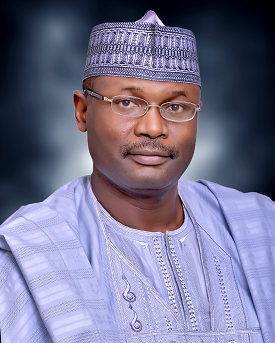The Chairman of Nigeria’s Independent National Electoral Commission (INEC), Prof. Mahmood Yakubu, has praised Ghana’s political stability and electoral innovations.
Prof. Yakubu expressed his admiration during a media briefing after observing Ghana’s presidential and parliamentary elections.
He noted a striking contrast between Ghanaian and Nigerian politicians regarding loyalty to political parties.
“In Ghana, politicians rarely move from one party to another during general elections. This provides stability to their political system and supporters,” Yakubu said.
His comments highlight an issue in Nigeria, where political defections are common, often causing instability and confusion among voters.
Ghana’s latest elections showcased this stability, as former President John Dramani Mahama of the National Democratic Congress (NDC) emerged victorious.
Mahama defeated Vice President Mahamudu Bawumia of the ruling New Patriotic Party (NPP).
Bawumia, showing political maturity, conceded defeat and congratulated Mahama.
“The people of Ghana have spoken, and they have voted for change at this time. We respect this with all humility,” Bawumia said.
This marked the end of two terms under President Nana Akufo-Addo, whose tenure faced economic challenges, including soaring inflation and a debt default.
Prof. Yakubu observed the elections alongside Yiaga Africa, an election monitoring group.
He lauded Ghana’s ability to sustain political party loyalty over decades.
“Ghana’s opposition candidates often persevere and contest multiple elections before winning. This builds trust and consistency in their democracy,” Yakubu added.
Mahama’s victory reflects this trend, as he previously served as Vice President and later as President.
Yakubu also commended Ghana for adopting a decentralized approach to announcing election results, inspired by Nigeria.
Until recently, Ghana centralized all results announcements in Accra, causing delays and inefficiencies.
Now, parliamentary results are declared at the constituency level, while only presidential results are sent to Accra.
“This is a lesson Ghana learned from Nigeria. It has significantly improved the speed and transparency of their electoral process,” Yakubu explained.
He noted that this decentralized method was implemented for the second time in this election.
The INEC chairman expressed satisfaction with the overall conduct of the elections.
“We are grateful that the election has gone very well. The process and its outcome so far have been commendable,” Yakubu said.
The election serves as a stark reminder of the differences in political cultures between Ghana and Nigeria.
In Nigeria, politicians frequently switch parties, often driven by personal ambitions rather than ideological commitments.
This behavior has contributed to political instability and voter dissatisfaction.
Ghana’s ability to maintain party loyalty and stability provides a model for other African nations, Yakubu suggested.
The elections also showcased political maturity, as both major candidates displayed respect for democratic norms.
Mahama’s NDC not only won the presidency but also secured victory in the parliamentary elections.
The results reflect widespread dissatisfaction with the economic challenges under the ruling NPP.
However, the peaceful transition of power is a testament to Ghana’s strong democratic foundations.
Yakubu’s observations highlight the importance of learning from Ghana’s electoral successes.
Nigeria, as Africa’s largest democracy, can adopt some of these practices to strengthen its political and electoral systems.
The INEC chairman’s visit underscores the value of regional collaboration in improving governance across West Africa.
For many Nigerians, Ghana’s example offers hope for a more stable and consistent political future.
As Yakubu pointed out, “There are lessons for us to learn from each other, and that’s what makes democracy beautiful.”

